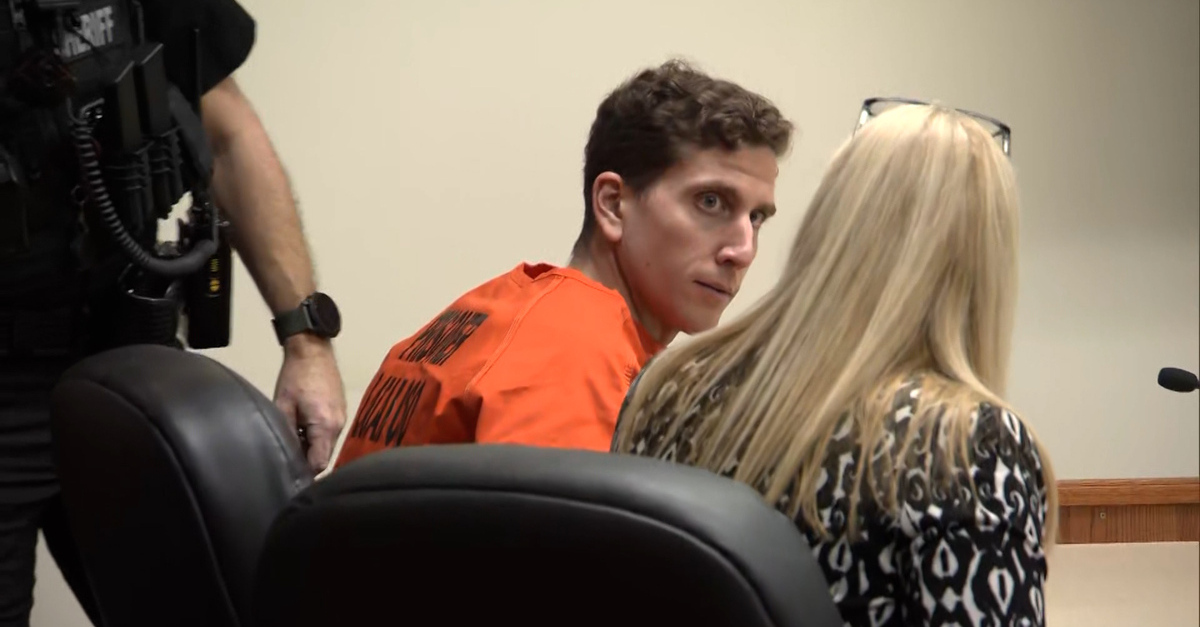
Bryan Kohberger appears to consult his attorney during his arraignment in Moscow, Idaho on Jan. 5, 2023 (image via screengrab/Law&Crime Network).
Unlike his extradition journey from Pennsylvania to Idaho — which took more than 15 hours by plane — it was a short trip for accused killer Bryan Kohberger to make his first court appearance at the Latah County Courthouse on Thursday morning: he had spent the night in the Latah County Jail, which is part of the same building.
Kohberger, 28, currently stands accused of repeatedly stabbing and killing University of Idaho students Kaylee Goncalves, 21; Madison Mogen, 21; Xana Kernodle, 20; and Ethan Chapin, 20, with an “edged weapon” at around 4:00 a.m. on Nov. 13, 2022.
The defendant’s initial appearance on four charges of murder in the first degree and one charge of felony burglary occurred at around 9:30 a.m. Pacific Standard Time on Thursday. He was represented by Kootenai County public defender Anne Chere Taylor. Relatives of the victims were also present.
Largely uneventful, the roughly 15-minute-long hearing was equal parts perfunctory and mechanical. Prosecutors said very little and the defense also appeared not keen on litigating much of anything.
In Courtroom 1, reportedly the largest courtroom in the building, Second Judicial District Magistrate Judge Megan E. Marshall apprised the defendant of his rights as a criminal defendant before going over the five charges against him.
Asked each time if he understood each charge, the defendant replied: “Yes.”
“I have a court-appointed counsel,” Kohberger said moments later when asked by the judge about his preferred form of legal representation.
While both sides remained tight-lipped during the arraignment, investigators offered voluminous information in a probable cause affidavit by Moscow Police Department Corporal Brett Payne.
A paragraph at the beginning of that affidavit references a “tan leather knife sheath” found on the bed next to Mogen’s dead body. That sheath, police allege, was decorated with a U.S. Marine Corps insignia. That sheath appears to be sold part-and-parcel along with a KA-BAR straight edge knife, which the company advertises as the “most famous fixed blade knife in the World.”
The affidavit goes on to document the chilling last moments of the victims’ lives, as told by a surviving roommate. Dylan Mortensen allegedly told police that she heard Goncalves say “there’s someone here” just before she was stabbed to death. Police have indicated that the voice Mortensen heard may have been Kernodle’s voice, based on records that show the victim using TikTok at around 4:12 a.m.
After that, Mortensen allegedly told police, she heard “what she thought was crying coming from Kernodle’s room” just before she heard a male voice offer solace to the slain students. Then, the surviving roommate allegedly said, a man wearing all black, with a mask over his nose and mouth, but revealing his “bushy eyebrows,” walked right past her and towards a door leading out of the house.
In the days that followed, investigators performed a so-called “video canvass” of private security footage and ascertained what appeared to be a white Hyundai Elantra from an indeterminate year repeatedly driving past the off-campus housing. The car was reportedly stopping and going, making at least one “three-point turn” before hightailing it out of the neighborhood at around 4:20 a.m., the affidavit alleges.
Twelve days after the slaughter, an alert for white Hyundai Elantras went out to area law enforcement. On Nov. 29, 2022, two members of the Washington State University Police Department independently connected a 2015 edition of the car to the defendant. After surveying his driver’s license, Payne determined Kohberger matched the description of the suspect — right down to the bushy eyebrows.
Investigators say they consulted various cellular data, including the defendant’s own phone records. Those records allegedly evidence an effort by Kohberger to conceal his location on the night of the murders while also suggesting he stalked the victims or surveilled their residence at least 12 times between June and November 2022.
A search of the trash from the defendant’s family home in Pennsylvania allegedly returned his father’s DNA. Genealogical testing of that profile suggested that Kohberger’s DNA was likely left on the “button snap of the knife sheath” found beside Mogen’s body.
“I would like to ask the court to consider setting a bond,” the defense attorney said during the hearing, while noting that her request was “limited” due to the paucity of information before the court and that she herself has access to at present since she is new to the case.
“Kohberger is not entitled to bond in this case,” prosecuting attorney William Wofford Thompson Jr. said in response, noting the severity of the charges contained in the arrest warrant and then noting that the defendant was arrested “3,000 miles away across the country.”
The judge cited state law to set no bail, but said her decision was pending “additional or further information” and further proceedings.
The state also requested a no-contact order, to which the defendant agreed. The judge issued those orders for the two surviving roommates as well as for the family members of the victims.
A status hearing in the case was set for Jan. 12, 2023 at 10:00 a.m. PST.
“This is the beginning of the criminal justice system,” Goncalves family attorney Shanon Gray told assembled news media after the short hearing. “The families will be here for the long haul.”
Listen to Law&Crime’s Sidebar podcast to find out why at least one expert predicted the exact murder weapon.